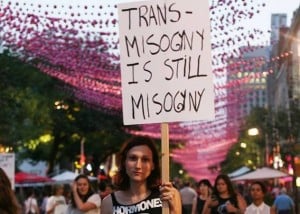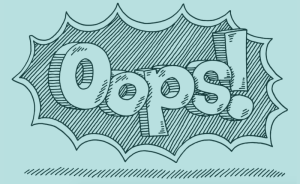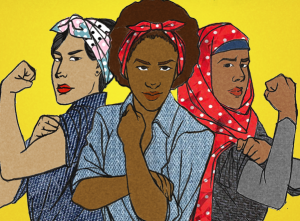
Source: dapperQ
I remember when I realized that I needed to stop checking women out on the metro.
I was looking at a cute girl and sliding my eyes up and down her body, almost unwittingly imagining her naked. Almost unwittingly.
And it suddenly occurred to me that she might not like being pictured naked by a total stranger — and that I was acting just like the gross male creeps I ranted about in my angry feminist tirades.
At the time, I identified as butch, not male, but I recognized that the problem was the same — seeing a woman’s body and acting like it was mine to ogle and fantasize about.
We sometimes think of these issues of sexual entitlement and objectification as purely a problem with men, but the reality is that masculine women do it, too.
My friend once pointed out that butches “take a step away from female solidarity” when they dress and act more masculine. They’re perceived as more threatening.
When somebody deliberately signaling “I’m masculine/butch/ag!” disrespects you in a way traditionally associated with men, it can be, and often is, just as distressing.
I started dating my current partner — an almost exclusively feminine-presenting, female identified woman — after I’d begun presenting as masculine. She once got annoyed with me for putting my hand on the small of her back and leading her around when we were in a crowded room. I was irritated with her for objecting. My ex (also a feminine identified woman) hadn’t minded that at all, and I couldn’t see what the problem was.
But then I remembered: I met my ex before I began identifying as butch.
I discovered later that my girlfriend had always perceived me as being more masculine than my ex had. She responded to me the way she would have responded to a man.
This conversation, early in our relationship, was the beginning of my process of re-learning how to interact with women.
And if you, too, have recently moved into a masculine-presenting space, here are some ways to rethink your masculinity.
1. Identify Your ‘Problem Areas’
Every feminist MoC person has their own “problem areas” when it comes to eliminating sexist behavior from our lives.
Some of us have trouble remembering not to objectify women. Some of us have trouble remembering not to participate in the subtle devaluation of women in the workplace. Some of us have trouble rejecting the virgin-whore dichotomy.
My problem is entitlement.
I’m a good feminist in many ways, but I struggle with entitlement. I’ve absorbed, clearly, the message that men are entitled to things from women like sex and attention. Most of the time, I don’t actively expect these things from women, but sometimes I catch myself getting upset at a woman for not paying attention to me the way I expected.
I mostly treat women with respect and as equals outside of romantic relationships, but my feminism within relationships needed updating as I began to transition. I am a dominant person, and my assumption has always been that I would dominate my romantic partner.
That’s a problematic assumption no matter what your gender, but as I lived more as a masculine person, my female partners pointed out that there was nothing separating me from the men I abhorred who assumed they should be the boss in their relationships.
I had accidentally acquired the entitlement of being a masculine person when I started dressing and acting like one.
And I had to actively notice that if I wanted to change it.
2. Recognize the Real-Life Effects
As I’ve become more vocal about my masculinity and more insistent upon its recognition, I’ve had to change the way I interact with my female partners.
Society doesn’t help me combat this — in fact, it does the opposite. As I’ve moved along the gender spectrum from more-feminine-than-not to more-masculine-than-not, I’ve noticed a shift in how I’m treated by other men and women.
As I’ve become more comfortable with my masculinity, I’ve been more willing and expected to take charge in a relationship.
Early in my relationship with my current girlfriend, we were out dancing with friends, including another butch who we’ll call Romeo. Romeo asked me for a dance with my girlfriend before consulting with my girlfriend.
This struck me as strange, but it was business as usual for Romeo. She was following the social conventions she knew, which were that you ask the “boi friend” of the girl you want to dance with/romance/buy drinks for before you engage with the girl.
It’s a form of queer chivalry. And much like heterosexual chivalry, it writes the feminine woman’s autonomy out of the picture.
Sexist men, too, are more likely to assume I’m on board with sexist jokes. A man I worked with made a joke about beating his wife in front of me and a group of women, and looked at me when it didn’t go over well, as if I’d understand.
We need to notice these things.
3. Redefine Masculinity — Individually and Globally
With the gendered messages that men should be in control and dominant, as well as the different treatment from other men and masculine people, it’s difficult to figure out how to be respectful of women while preserving my masculinity.
I get bombarded with messages that to be masculine is to be in control and that treating women respectfully makes me less of a man.
Y’all, this is hard. Pressure to conform to gender standards is like peer pressure multiplied.
My feminism has had to change from a feminism of solidarity to a feminism of recognizing that I’m different, and that I need to own that and change my behavior.
It may not seem like such a big deal to grapple with some stress and discomfort resulting from the clash of my gender messaging and my commitment to treating women with respect. And it isn’t, really. I’ll pay the small psychological price for having a healthy and respectful relationship with feminine-identified people.
But what about the men and masculine people who don’t want to or can’t deal with the shame and frustration that comes with ignoring the cultural script for what makes a man a man? They’ll continue to treat women badly.
The solution is to change the conversation.
Being a man isn’t about domination, and it definitely isn’t about subjugation of feminine people. We need to find a way to re-frame masculinity so that it isn’t diametrically opposed to respectful and equal gender relations.
***
So who is leading this work? As of now, it’s a grassroots network of groups, like the Brown Boi Project and Men Can Stop Rape, writing and teaching and trying to combat the notion that masculinity inherently involves violence.
They are doing amazing work, but we need to be doing more.
We need to divorce masculinity from violence in the media. How can we learn that masculinity can be gentle and respectful if the idealized masculine hero is a man who dominates his environment and destroys anything that gets in his way?
We need to teach young boys that respectful give-and-take is the ideal way to have a conversation—it’s not all-important to “win” every interaction.
We need to give men and masculine people a way of expressing our true selves without using the oppression of feminine people to show how big and strong we are.
[do_widget id=”text-101″]
Wiley Reading is a Contributing Writer at Everyday Feminism. Wiley is a New Jersey-born artist, writer, environmentalist, and social justice advocate located in Burlington, VT. He works as a community health worker for the Greater Burlington YMCA, and writes for Disrupting Dinner Parties, a small collective feminist blog. In his free time, Wiley draws bugs and old buildings, loves every show on the Food Network, makes creative (read: pulled from the recycling) toys for his bunnies, and tipsily reminds every person in every bar that New Jersey is the best state. Follow him on Twitter @wreadinggo.
Search our 3000+ articles!
Read our articles about:
Our online racial justice training
Used by hundreds of universities, non-profits, and businesses.
Click to learn more
Most Read Articles
- « Previous
- 1
- …
- 30
- 31
- 32



















